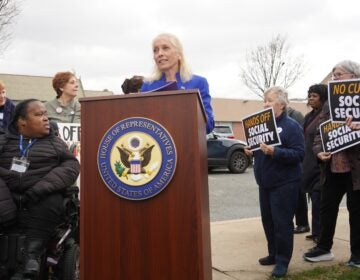The role of cognitive decline in financial elder abuse, and what we can do about it
Cognitive decline robs people of their identity, independence and financial security. The banking industry may be able to help identify it before dire financial impact.

(echoevg/Big Stock Photo)
Anyone who has experienced the pain of watching a friend or loved one suffer from dementia knows that it is a thief, robbing people of their identity, independence and, ultimately, their lives. Few, however, realize how often it robs older adults of their financial security. The good news is the banking industry may be able to help identify cognitive decline before it has dire financial impact.
Philadelphia resident Renee Packel, 82, was caught completely off guard when, one day in 1999, her homeowners association called to ask why the Packels were three months late paying dues. The Packels had always paid their bills on time, and the association dues were no exception. Renee’s husband, Arthur, a graduate of Temple Law School, had kept their financial records pin-straight for years until, unbeknownst to Renee, things began to unravel.
When Renee examined the couple’s checkbook, she found that Arthur’s entries had gradually become illegible. So many things had gone awry that it took a forensic accountant to determine that $750,000 was missing from their savings. Renee sold the house and car and moved herself and Arthur into an apartment. Then, in order to go back to work, Renee was forced to enroll Arthur in adult day care.
In 2000, Dr. Jason Karlawish at the Penn Memory Center at the University of Pennsylvania diagnosed Arthur with probable Alzheimer’s disease. The disease had already cost them $750,000, and would cost much more in medical care and assisted living.
Increasingly commonplace
Renee and Arthur’s experience may have been unique two decades ago, but today such stories are increasingly commonplace. The U.S. population is both aging and living longer. These demographic shifts bring with them an increased risk for diseases affecting cognition, the mental process by which knowledge and understanding are accumulated, actions are taken, and decisions are made.
As we age, our brains undergo changes that can inhibit cognitive abilities such as creative thinking, problem solving, and retaining new information. To some extent, these are considered normal. However, progressive memory loss and abnormal declines in cognitive ability may signal the onset of mild cognitive impairment, or MCI, a precursor to dementia.
Scientists don’t know why cognitive decline occurs, but they have found that those diagnosed with conditions such as dementia have experienced definite biological changes to their brain and its functioning, long before any formal diagnosis can be made. This creates serious financial risks for aging people, still at the helm of their own finances, unaware that impaired cognitive function may be affecting their decisions.
Indeed, the financial damage can begin well before someone is diagnosed with a cognitive or neurological condition, and it is estimated to cost older Americans billions of dollars each year. Older adults with cognitive impairment are more likely to make financial mistakes or to be the target of fraud or financial exploitation.
Fraud involves efforts to deceive someone with promises of goods, services or financial benefits that may not exist; acts of exploitation include cashing someone’s checks without permission, forging signatures, or improperly using the authority of conservatorship, guardianship, or power of attorney. According to FinCEN, reported incidents of elder financial exploitation grew by an average of 20 percent annually over the past four years.
A silver lining
Fortunately, among these very dark clouds there is a silver lining. Since confusion over money and finances tends to occur well before any condition can be diagnosed, the banking activity of older households may hold a key to early detection of cognitive decline. In a recent STAT column, Karlawish wrote that, “Our day-to-day use of our money provides signals of brain function that can be far more […] meaningful than the results of online cognitive tests and brain scans.”
To some degree, every financial institution has the ability to monitor customer accounts for suspicious activity. Since 1970, banks and other financial institutions have been required to monitor all transactions for certain types of activity, including money laundering. The same tools and resources financial institutions use to comply with these requirements can be used to identify older persons who may be caught up in a financial fraud or exploitation scheme.
Of course, changes in the way we conduct our banking will require changes in the way we monitor financial activity. For the Packels, Arthur’s checkbook entries were telltale signs of his gradual loss of financial capacity. As online bill pay and paperless statements replace checks and letters, transaction activity will exist only in the virtual world, necessitating the introduction of innovative tools such as accounts with read-only access and SMS or email notifications of suspicious account activity.
Financial institutions can also leverage their call center and branch visit data to identify signs of possible cognitive impairment before a loss occurs. The data could be used to track customers calling in with frequent requests for password resets or balance checks, or customers who make multiple trips to a branch for the same transaction. In the near future, financial institutions may also be able to harness biometric technology to detect changes in time spent online performing basic tasks, as well as changes in typing patterns and mouse pointer activity. Combining these bits of information may lead to more accurate assessments of cognitive changes and financial vulnerability.
Time to act
Industry participants are beginning to take notice. At a Federal Reserve Bank of Philadelphia conference in November, co-sponsored by the Penn Memory Center and Healthy Brain Research Center, representatives from across the financial services industry gathered to discuss the links between cognitive decline and diminished financial capacity.
Bankers on the forefront encouraged their peers to act now, before resources were overwhelmed, and to consider the opportunity to take a poor customer experience and turn it into something positive, with the possibility of improving retention of both customers and wealth. Philadelphia Fed President Patrick Harker noted that the effects of elder financial exploitation could spill over into the larger economy.
Acting now is in the interest of everyone — the economy, the financial system, and, most of all, our most vulnerable elderly households. The Philadelphia Fed is committed to working with the financial sector to create safeguards for older, vulnerable adults. In the meantime, older adults and their families can go to the Women’s Institute for a Secure Retirement website to learn how to spot the signs of elder fraud and financial exploitation. If you see suspicious activity, say something by reporting it to your local Adult Protective Services agency.
—
Larry Santucci is a senior industry specialist at the Federal Reserve Bank of Philadelphia.
WHYY is your source for fact-based, in-depth journalism and information. As a nonprofit organization, we rely on financial support from readers like you. Please give today.




